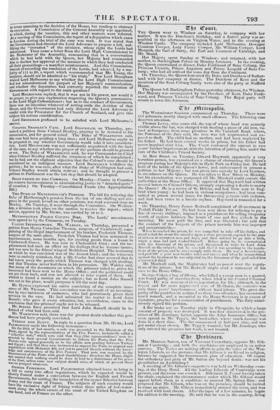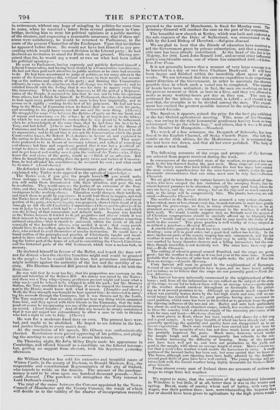Zbr 1Probintes.
Mr. Manners Sutton, son of Viscount Canterbury, opposes Mr. Gib- son at Cambridge ; and both the candidates arc employed in an active canvass. The Tories are making efforts to gain the votes of the Wes- leyan Liberals, on the pretence that Mr. Gibson is no friend to religion, because lie supported the Government plan of educatiou. Of course the orthodoxy and piety of Mr. Sutton are beyond doubt: was not his grandfather an Archbishop ?
A meeting of Mr. Gibson's supporters was held on Wednesday even- ing, at the Hoop Hotel. All the leading Liberals of Cambridge were present, and the room was crowded. Alderman It. Foster having taken the chair, explained the circumstances under which Mr. Gibson would appear before them as a candidate to succeed Mr. Spring Rice ; and proposed that Mr. Gibson, who was on the premises, should be invited to come up stairs. Mr. Gibson immediately entered the room, and was received with loud cheers. After the lapse of a few minutes, he began his address to the meeting. Ile said that he was in the country, living. in retirement, without any hope of mingling in politics for some time to come, when he received a letter from several gentlemen in Cam- bridge, inviting him to state his political opinions at a public meeting of the electors, and expressing a reasonable assurance, that if these opi- nions were satisfactory, he would be returned to Parliament, in the room of the present Chancellor of the Excheqner. Upon that invitation he appeared before them. Ile would not have lent himself to any pro- ceeding which would have caused division in the Liberal party : he had declined an invitation to stand for Perth on that ground. Having pre- mised thus far, he would say a word or two on what had been called his political apostaey- He went to Parliament, having expressly and publicly declared himself a Liberal Conservative, and having been elected by a Conservative constituency. He had not then paid such attention to public matters as he since tad occasion to do. Ile had been accustomed to judge of politics, as too many others in the ranks of the Conservatives did, without reference to their merits, but accord- ing to the notions and objects of his party ; and forming this Conservative estimate, he came to the conclusion that all change was to be opposed; and he satisfied himself with the feeling that it was his duty to oppose every thing like innovation. When he undertook, however, to fill the post of a Represen- tative of the People, it occurred to him that he was not to take his opinions from others, but to think for himself. In Parliament, therefore, he determined to look upon every public matter which catne before him impartially, and to reason on it rightly:'cording to the best of his judgment. Ile hats not been long in the House of Commons W hen he found, that to vote %vitt' his party., and according to his judgment, was not one and the same thing. (Cheers.) Ito struggled for some Goo, bet ween the dictates of party on the one hand, and of reason and conscience on the other : he at length gave way to the latter ; by which he was not ashamed to confess that he was prowl to be influenced, when he acknowledged, at the same time, that he had done his best to be a Tory, and had tidied. (Cheers and latailder.) He had sat in the House of Commons, and looked upon Conservatism in all its colours, and listened to all its arguments; and he found that it was not the Conservatism which the great conservative leader, Sir Robert Pi e1, declares in fiiemu. of; and explained to the nation in his &mous address to the Tainworth. That mani- festo professed to be in favour of necessary reform::, and talked of remedying teal abuses ; but time and experience proved that it was but a jesuitical at- tempt to deceive the ennui and steadily-thinking portion of the cominunity, and to get honest and worthy men to join the ,:ankg of the Tories ; who, if they knew the real views of the party, would never think of an adhesion. But when he found that by seceding from the party views and tactics of Conserva- tism, he had offended his constituency, he ':signed his seat ; and what could he du more? (Loud cheers.) Ile defended his vote upon the Government plan of education, and explained why Tories were opposed to the spread of knowledge— The Tories said, if you give the people knowle/fP you would make them unhappy : teach them history, and geography, and arithmetic, and you will make them discontented with their situation, and pave the way to revolution. Thee would soon see the justice of an extension of the fran- chise, and they would begin to think that the Corn-laws were not so very ad- vantageous to the working classes. Education would sharpen their intellects, and teach them to profit by experience. It would lead them to imptire, and well the Tories knew all this, and good rees-on had they to dread inquiry ; and every portion of the party, whenever inquiry was proposed, showed their dread of it as strongly' as did the out Cambridge corporation—(Cheers and lanyhter)—if he
Ives to judge by a book which had been recently put into his hands, and which was the history of that immaculate and defunct body. Inquiry was hateful
to the Tories, because it tended to di-pel prejudices and abwoes which it was their interest to keep up and maintain. This, then, was his ophdon respecting national education—that it should be universal, within the reach of all, and especially of the humblest classes, who needed it most ; that every parish should have its day-sellool, open to floe Roman Catholic, the Dissenter, or the Jew, who wished to avail themselves of secular instruction. Ile would have a broad outline of the principles and practice of Christianity taught and incul- cated in those schools; but he never should consent to the nonsense of spend- ing the better part of the hours of school in committing the Church Catechism and the historical parts of the Old Testament, which were a useless task, to memory.
lie declared himself in favour of the Ballot, and hoped the time was not far distant when the elective franchise might and would be granted
to the people ; but he would bide his time, lest premature interference might militate against the authority of the law and the stability of so- ciety. llis Electors Removal Bill proved that he dabbled a bit with the franellise- fie was told that he went too far ; that his proposition was contrary to the spirit and intention of the Reform Bill. An outcry was raised by the Tories ; and there was a Tory whip—(many gentlemen resent might not know what a whip was)—and he refused to be whipped in with the pack ; but Mr. Manners Sutton, the Tory candidate for Cambridge, if ever he enjoyed the honour of a seat in the House, would know well what it meant. (Lauyhter and cheers.) Well; the Tony strength was brought to bear against him : he succeeded in carry- ing his measure through the Commons, but it was thrown out by the Lords. The Tory majority of that assembly could not bear any thing which emanated from hint, and they agreed with their friends in the Commons, that the inde- pendent course he was pursuing was one of the grossest pieces of insubordination on record. (Lout) laughter.) And all this was because he simply maintained that it was not unjust nor extraordinary to allow a man to vote in October who had a right to vote in July. (cheers.) He was for a moderate fixed duty on corn. The present laws were bad, and ought to be abolished. lie hoped to see reform in the law, and justice brought to every man's door. At the conclusion of his speech, Mr. Gibson was enthusiastically cheered. Resolutions were passed approving of his politics, and pledg- ing the meeting to use every effort to secure his return.
On Thursday night, Sir Jo'n Milky Doyle made his appearance in Cambridge, and offered himself as a candidate on the Liberal interest ; but, getting no support from electors, took his departure yesterday afternoon.



























 Previous page
Previous page